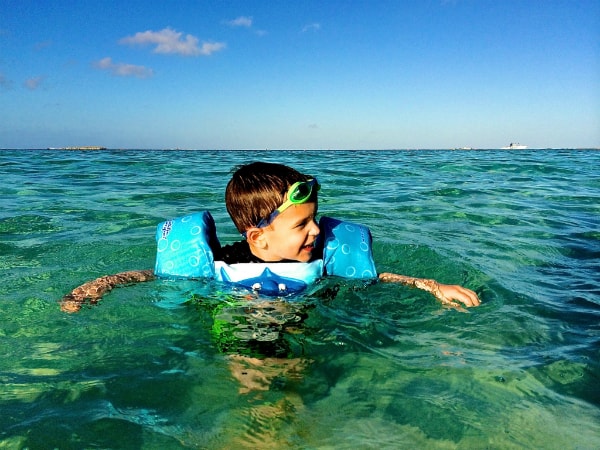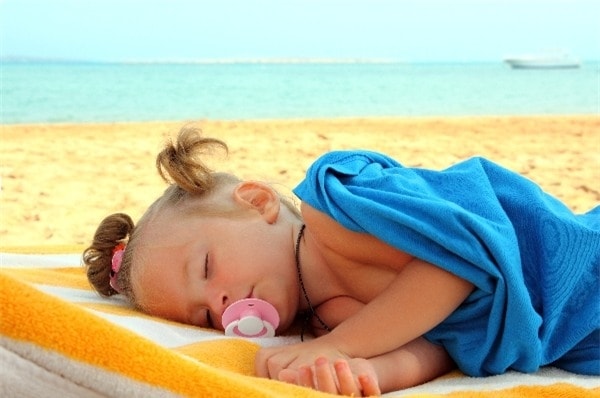Things mothers must remember when taking their children to the beach
When traveling by boat, you must make your children wear life jackets. When eating, you should not let your children eat seafood they have never tried before.
Summer is the season of beach tourism, many families have planned for the whole family to go to the beach to relax, enjoy the cool, windy air at famous beaches. In addition to the places to eat, play, and convenient hotels, mothers when taking their children to the beach need to remember the following vital notes to ensure absolute safety for children, avoid health problems or unfortunate accidents.
When traveling by boat
The immutable rule when traveling by boat is to make sure your child wears a life jacket, then check to see if the life jacket is usable (is it torn or punctured or not), if you are abroad, ask for a "life vest" when asking about a life jacket.
Don’t be lazy or shy because no one on the boat is wearing one. Life jackets have saved many children when accidents happen. Therefore, never forget to put a life jacket on your child as soon as you step on the boat. If the boat doesn’t have a life jacket, don’t let your child on board. Don’t be confident in your swimming ability to save the baby because accidents happen very quickly and no one has time to react.
 |
Always let your child swim within your control. Photo: pokerstarsblog |
When swimming in the sea
Always keep your child within reach of you.
Every year, there are many drowning accidents involving children in tourist areas, even when they are using life jackets. Therefore, you must always keep an eye on your children and only let them play within the control of their parents.
When taking children to the beach or to places with rivers and streams, adults must always control them. Only let children play near the shore, with parents holding lifebuoys. Many people often let their children use lifebuoys by themselves, which is very dangerous because children can easily be swept away without knowing, and are likely to be hit by waves without you being able to react in time.
Avoid cold
Children often love playing in water and this can easily make them catch a cold, leading to a fever. Therefore, the ideal time for children to play in water and in the sun is no more than 2 hours continuously.
Immediately after your child comes ashore, you must prepare a dry towel to dry the body, then rinse with fresh water and change the child into dry clothes. Even after coming ashore, the body being wet will make the child catch a cold. Not bathing the child in clean seawater can also cause the child's skin to become red, itchy and allergic.
Avoid heatstroke
In addition to the risk of catching a cold from swimming in the sea for too long, children are also susceptible to heatstroke when playing outdoors under the harsh sunlight of the sea. Mothers need to prepare thick coats and hats to protect their children before going outdoors, make sure to cover their heads and necks from direct sunlight and it is best not to let children play outside from 10am to 3pm because this is when the sun is at its harshest.
Make sure your child drinks plenty of water and it is best to supplement with vitamins A and E as prescribed by your doctor. This will reduce the risk of sunstroke and allergies while at the beach.
 |
Do not let children play in the sun for long to avoid heatstroke. |
When eating and drinking
Except for babies who are still breastfeeding and eating solid foods, when taking their children on a beach trip, parents need to pay attention to whether their children are allergic to seafood or not. There are many types of food that your baby has never tried before, so you should not risk it because if an allergy occurs, it will be very difficult to handle, even life-threatening. You should avoid foods with high mercury content such as whale, swordfish, tuna, and mackerel.
It is best to consult your doctor before starting the trip, and consult about allergy shots to keep your child in the best health throughout the journey.
First aid in case of accident
When a drowning accident occurs
In case of an accident while swimming, you need to quickly call for help from those around you, with priority given to the nearest rescue team.
After bringing the baby to shore, it is necessary to check the airway. If there is a foreign object in the mouth or nose, it must be removed immediately, then tilt the baby so that the baby can breathe. If the baby stops breathing, it is necessary to immediately perform artificial respiration by placing the baby on his back, pinching his nose, blowing a strong breath into the baby's mouth 2-3 times, then clasping your hands together, pressing on the baby's chest rhythmically (be careful not to use too much force because the baby's bones are weak) until the baby breathes again; then quickly take him to the nearest medical facility.
When sunstroke
Immediately take your baby into the shade, indoors, with a gentle fan, do not put your baby in an air-conditioned room immediately as he will suffer from heat shock. Wipe your baby with cool water and give him oral rehydration solution. If the condition worsens, take him to the hospital.
According to Ngoisao.net
| RELATED NEWS |
|---|

